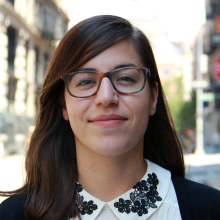July 2019 Spotlight on the SRCD Policy Fellow: Paula Daneri, Ph.D.
2018-2019 Federal Congressional Policy Fellow
Ever since I started working in research as an undergraduate, I have sought to understand how our findings could inform policy and practice. In my quest to connect research to policy, I quickly learned that research and policy are largely distinct worlds, each with its own language, assumptions, and rules. Bridging the two wouldn’t be as straightforward as I had hoped. Effectively communicating research findings to policy professionals would require a set of tools that I couldn’t acquire from the comfort of the lab.
I decided to take on the challenge of learning about policy after graduating from my doctoral program. The SRCD Policy Fellowship seemed like a perfect opportunity to dive head first into policy while continuing to receive mentorship and support from leading scientists in the field, affording me a connection to research while submerged in the world of policy. Before I began my time as a fellow, I imagined my role would be to encourage policymakers to allow research to play a role in policy discussions. To my surprise, I found that research already guided decisionmaking at my placement in the House Committee on Education and Labor. Policy experts on the Committee were eager to learn about evidence that can inform the development of federal policy and were much more knowledgeable about research than I was about policy.
In fact, the first task I was asked to tackle as a fellow was drafting a report examining the research literature on the costs and benefits of a college degree to inform federal higher education policy. Luckily, the report presented an ideal transition into the fellowship, allowing me draw on my research skills while also providing me an opportunity to learn about the policy-making process. Each conversation I had with my new colleagues as we drafted the report helped me better understand their perspectives and gave me insight into their approach to crafting policy. From the questions they asked to the edits they added, each interaction became a learning experience.
Since the completion of the college report, the focus of my work on the Committee has shifted to early childhood and child welfare, aligning more closely with my expertise. My most enjoyable and challenging experience to date as a fellow has been taking the lead on the reauthorization of the Child Abuse Prevention and Treatment Act (CAPTA). CAPTA, a law that funds programs aimed at preventing child abuse and supports states in responding to reports of child abuse, has long been due for a comprehensive update. Working on this legislation helped me realize the breadth and depth of the knowledge that developmental scientists have accumulated about how to best support families to raise healthy, strong children. It felt incredibly rewarding to have the opportunity to inform legislation through a developmental lens. During the CAPTA reauthorization I also got firsthand experience seeing policy, politics, and process play out in the crafting of bipartisan legislation.
My experience as a fellow has thus far surpassed any expectations I had when I accepted the position. I now realize that my understanding of policy-making was so limited that I did not understand how much I did not know. I feel as though in the year I have spent in Congress I have only just begun to understand the policy-making process. At the same time, my work on the Committee has informed my perspective as a researcher. For example, interacting with policy experts has shown me which issues the early childhood field struggles to answer, such as defining quality care and education, and replicating across all levels of education. This work has also revealed both how far developmental research has come but also how much room the field has to grow.
I am incredibly grateful to SRCD and the Committee on Education and Labor for allowing me the opportunity to take on the challenging and rewarding work of contributing to federal policy. I am especially indebted to our two SRCD mentors, Marty Zaslow and Ruth Friedman, for their unwavering support and encouragement during the past year. The fellowship would not be the impactful experience it is without their guidance and their recognition that developmental scientists can and must play a role in federal policy.
